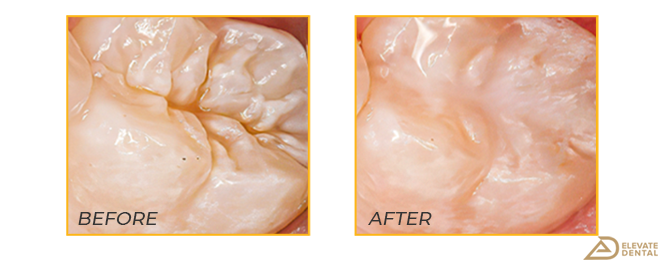Dental Sealant
A dental sealant is a thin, protective coating applied to the chewing surfaces of teeth, acting as a formidable shield against tooth decay. By quickly bonding to the depressions and grooves of the teeth, it forms a reliable barrier over the enamel of each tooth. Dental professionals often recommend applying sealants to newly erupted molars and premolars, safeguarding these vulnerable areas from the threat of cavities.

The Advantages of Dental Sealants
Dental sealants offer a fast and painless solution to safeguarding teeth against cavities. Once applied, they boast an impressive track record of protecting teeth against up to 80% of cavities for a period of up to two years. This simple procedure becomes particularly crucial for children, as nearly 90% of cavities are known to occur in their permanent molars or back teeth. By getting dental sealants on these teeth as soon as they erupt, parents can provide their children with an early and effective defense against dental decay.
The Procedure for Dental Sealant Application
- Applying dental sealants is a straightforward process, commencing with a simple consultation and requiring only about 30 minutes of chair time.
- Here’s a breakdown of the procedural steps during a dental sealant application:
- Thorough Cleaning: The teeth undergo meticulous cleaning to ensure that the surfaces are free from debris and plaque.
- Drying: Each tooth to be sealed is carefully dried using cotton or gauze, creating an optimal environment for the sealant application.
- Chemical Roughening: An acid solution is delicately placed on the grooves of the teeth, gently roughening the surface to enhance the sealant’s adhesion.
- Rinsing and Drying: The teeth are then thoroughly rinsed to remove any residual acid, followed by gentle air drying.
- Sealant Application: The dental sealant is skillfully applied onto the enamel of the teeth, where it bonds directly to the grooves and subsequently hardens. This process ensures a secure and long-lasting protection against cavities. A specialized light-curing machine is utilized to expedite the hardening process, making it both efficient and effective.
- Maintenance and Reapplication: While dental sealants provide robust protection, they may require reapplication over time, especially if they break or wear down. Regular visits to the dentist for general check-ups are essential not only for reapplication but also for maintaining optimal oral health.
- By undergoing this simple and painless dental procedure, individuals can fortify their teeth against the pervasive threat of tooth decay, promoting a lifetime of healthy smiles.
In some cases, dental sealants also need to be reapplied since they can also break. Regular visits to the dentist for a general check-up are necessary for reapplication and to maintain good oral health.




